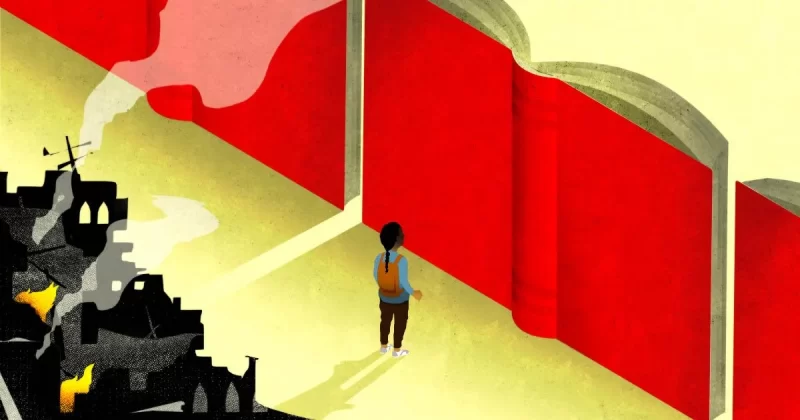
Refugee children living in Ritsona reception center denied access to education in 2020 and 2021



For the school year 2020-2021, the refugee reception center in Ritsona housed 860 children aged 4-17 from Syria, Afghanistan, Somalia, Congo, and Cameroon, of which 250 students were of age to attend secondary education, 400 primary and 237 infants who, up until the pandemic movement restrictions were imposed, were in kindergarten within the center.
The children in the facility were cut off from compulsory public education from the beginning of the first lockdown on March 13, 2020 until October 2021, with the exception of a few short time periods. Unlike the rest of the children in the country, though, they did not have access to distance learning, due to the lack of appropriate equipment (i.e. a tablet or computer for each child) and the lack of an adequate internet connection.
Other obstacles in access to education for these children were the delay in the appointment of teachers, who were hired on 16/12/2020, but chiefly the bureaucratic obstacles related to the completion of the competition process for awarding a contract to transport the children to the surrounding schools.
On 11.1.1 2021 children of primary school age returned to school based on Article 2 of the Joint Ministerial Decision, 969/2021 Government Gazette 23/Β/7-1-2021. However, due to a decision by the Municipality of Chalkida mentioned below, the children of Ritsona who were already enrolled in schools continued to be excluded from access to education, and restricted to the reception center of Ritsona. Up until the end of the school year, the majority of children were unable to attend public education either live or remotely.
With the new year, obstacles to access to education for children remained in place. In Ritsona, most children have been attending school regularly since October 2021, but 200 children, and now a further 100 who have reached primary school age remain excluded due to the lack of transport available. Refugee education coordinators are trying to fill this gap with a private initiative, as they did last year. Also indicative of the negligence of the local authorities is the Municipality of Chalkida’s decision to exclude refugee children from public education using the pandemic as a justification, which provoked a number of reactions, (1, 2).
The Ombudsman for Children, after receiving numerous reports on the denial of access to education for these children, including from the organization HumanRights360, published a report on 11.3.2021.
This negligence by the local, regional authorities as well as by the Ministry of Education, violates a series of domestic legal provisions; Articles 28, 51 and 60 of law 4636/2019 regarding the obligation of the state and the authorities to provide necessary and sufficient measures for the compulsory public education of the children of refugees and those who are applying for international protection; Article 21 paragraphs 7 and 8 of law 4251/2014 (Migration Code), on the common rights of third country nationals regarding the education of children; as well as Articles 28 and 29 of the Convention on the Rights of the Child, Article 2 of the First Protocol to the ECHR and Article 14 of the Charter of Fundamental Rights of the European Union.
Finally, the discrimination against refugee children regarding their access to education violates Article 3 paragraph 2 of law 4443/2016, Article 3 of Directive 2000/43/EC, Article 3 of Directive 2000/78/EC and Article 2 of Directive 2014/54/EU on non-discrimination, as well as Article 1 of the 10th Protocol to the ECHR and Article 14 of the ECHR on non-discrimination, in conjunction with Article 2 of Protocol 1 of the ECHR.
A combination of factors including the management of the pandemic and the restrictive security measures in the reception centers, a lack of tablets, computers and the lack of internet access within the accommodation facilities, in combination with bureaucratic delays in the recruitment of staff and the completion of a tender for the transportation of children from the center to the schools located in Chalkida and the surrounding areas, led to the universal non-access of refugee children to public school education for the second half of the school year 2019-2020 and for the school year 2020-2021.
They are also facing significant obstacles for the school year 2021-2022. This failure by the local and national authorities violates a number of domestic and international legal provisions, as detailed in the main text.
Bank Account number: 1100 0232 0016 560
IBAN: GR56 0140 1100 1100 0232 0016 560
BIC: CRBAGRAA
![]()
In a time where the very foundations of democracy are gradually being eroded by the rise of extreme nationalism, alt-right movements, the spread of disinformation and corporate capture, the efforts of organisations such as Vouliwatch are more relevant than ever.
We rely on the generosity of each and every one of you to continue with our efforts for more transparency and accounta
By financially supporting Vouliwatch you support our litigation strategy, our campaigns for transparency and accountability in the political system, the development of new civic tech tools, our research projects and last but not least our impartial and accurate